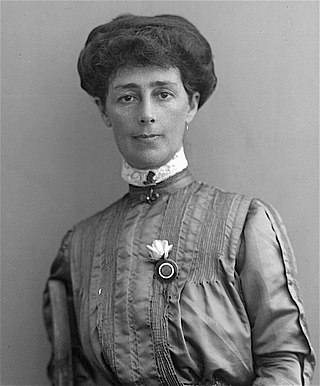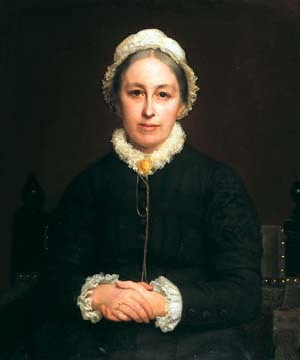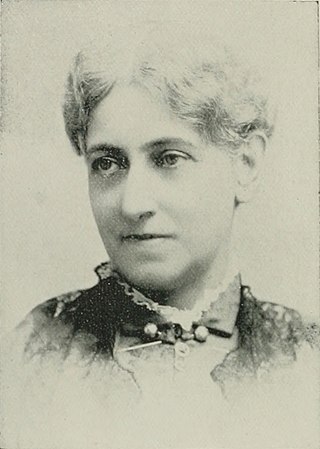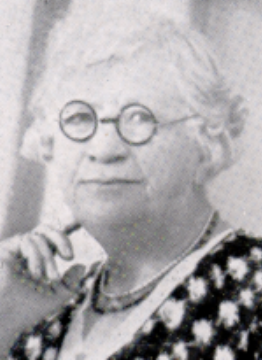Related Research Articles

Abigail Scott Duniway was an American women's rights advocate, newspaper editor and writer, whose efforts were instrumental in gaining voting rights for women.

The Women's Social and Political Union (WSPU) was a women-only political movement and leading militant organisation campaigning for women's suffrage in the United Kingdom from 1903 to 1918. Known from 1906 as the suffragettes, its membership and policies were tightly controlled by Emmeline Pankhurst and her daughters Christabel and Sylvia; Sylvia was eventually expelled.

Vida Jane Mary Goldstein was an Australian suffragist and social reformer. She was one of four female candidates at the 1903 federal election, the first at which women were eligible to stand.

Emma Miller was an English-born Australian pioneer trade union organiser, suffragist, and key figure in organisations which led to the founding of the Australian Labor Party in Brisbane, Queensland, Australia.

Dame Annabelle Jane Mary Rankin DBE was an Australian politician and diplomat. She was the first woman from Queensland elected to parliament, the first woman federal departmental minister, and the first Australian woman to be appointed head of a foreign mission.

Sarah Emily Davies was an English feminist who founded Girton College, Cambridge. She campaigned as a suffragist and for women's rights to university education. In her early life she attended meetings of the National Association for the Promotion of Social Science and befriended Barbara Bodichon and Elizabeth Garrett Anderson. After moving to London with her mother in 1862, she wrote for and edited the English Woman's Journal and joined the Langham Place Group. She co-founded the London Schoolmistresses' Association and the Kensington Society, which pressured for universal suffrage, although she herself believed only unmarried women and widows should gain the vote.
Government in Australia is elected by universal suffrage and Australian women participate in all levels of the government of the nation. In 1902, the newly formed Commonwealth of Australia became the first nation on earth to enact equal suffrage, enabling women to both vote and stand for election alongside men Women have been represented in Australian state parliaments since 1921, and in the Federal Parliament since 1943. The first female leader of an Australian State or Territory was elected in 1989, and the first female Prime Minister took office in 2010. In 2019 for the first time, a majority of members of the Australian Senate were women. At the time of its foundation in 1901, and again from 1952 to 2022, Australia has had a female monarch as ceremonial Head of State, while the first female Governor of an Australian State was appointed in 1991, and the first female Governor-General of Australia took office in 2008.

A suffragette was a member of an activist women's organisation in the early 20th century who, under the banner "Votes for Women", fought for the right to vote in public elections in the United Kingdom. The term refers in particular to members of the British Women's Social and Political Union (WSPU), a women-only movement founded in 1903 by Emmeline Pankhurst, which engaged in direct action and civil disobedience. In 1906, a reporter writing in the Daily Mail coined the term suffragette for the WSPU, derived from suffragist, in order to belittle the women advocating women's suffrage. The militants embraced the new name, even adopting it for use as the title of the newspaper published by the WSPU.

Women's suffrage in Australia was one of the early achievements of Australian democracy. Following the progressive establishment of male suffrage in the Australian colonies from the 1840s to the 1890s, an organised push for women's enfranchisement gathered momentum from the 1880s, and began to be legislated from the 1890s, decades in advance of Europe and North America. South Australian women achieved the right to vote in 1894, and to stand for office in 1895 following the world first Constitutional Amendment Act 1894. This preceded even male suffrage in Tasmania. Western Australia granted women the right to vote from 1899, although with some racial restrictions. In 1902, the newly established Australian Parliament passed the Commonwealth Franchise Act 1902, which set a uniform law enabling women to vote at federal elections and to stand for the federal parliament. By 1908, the remaining Australian states had legislated for women's suffrage for state elections. Grace Benny was elected as the first councillor in 1919, Edith Cowan the first state Parliamentarian in 1921, Dorothy Tangney the first Senator and Enid Lyons the first Member of the House of Representatives in 1943.

Elizabeth Piper Ensley, was an educator and an African-American suffragist. Born in Massachusetts, Ensley was a teacher on the eastern coast of the country. She moved to Colorado where she achieved prominence as a leader in the Colorado suffrage movement. She was also a journalist, activist, and a leader and founder of local women's clubs.

Mary Jane (Whitely) Coggeshall was an American suffragist known as the "mother of woman suffrage in Iowa". She was inducted into the Iowa Women's Hall of Fame in 1990.

Mary A. Ahrens, née Jones, was an English-born American teacher, lawyer, and social reformer.

Lady Barbara Steel was a Scottish social activist who actively campaigned for Women's Suffrage in both the United Kingdom and South Africa. She was the first woman to stand in an election for the Edinburgh Town Council, when she ran in the 1907 election. Steel moved to South Africa in 1911 and at the beginning of World War I founded an organization to provide aid to South African soldiers and their families. She was honored as an Officer in the Order of the British Empire for her civil service. In addition, she served as president of the Women's Enfranchisement Association of the Union from 1916 until 1930, fighting for women's right to vote in South Africa.

Helen Appo Cook was a wealthy, prominent African-American community activist in Washington, D.C., and a leader in the women's club movement. Cook was a founder and president of the Colored Women's League, which consolidated with another organization in 1896 to become the National Association of Colored Women (NACW), an organization still active in the 21st century. Cook supported voting rights and was a member of the Niagara Movement, which opposed racial segregation and African American disenfranchisement. In 1898, Cook publicly rebuked Susan B. Anthony, president of the National Woman's Suffrage Association, and requested she support universal suffrage following Anthony's speech at a U.S. Congress House Committee on Judiciary hearing.
Emily Jane Harding Andrews (1850–1940) was a British artist, illustrator and suffragette. She was a member of the Artists' Suffrage League.

The Hunger Strike Medal was a silver medal awarded between August 1909 and 1914 to suffragette prisoners by the leadership of the Women's Social and Political Union (WSPU). During their imprisonment, they went on hunger strike while serving their sentences in the prisons of the United Kingdom for acts of militancy in their campaign for women's suffrage. Many women were force-fed and their individual medals were created to reflect this.

Emily Hemans Bulcock (1877–1969) was an Australian poet and journalist.

Elizabeth Brentnall was an Australian suffragist, temperance activist and philanthropist. She was the first state president (1885–99) then honorary president of the Woman's Christian Temperance Union (WCTU) in Queensland.

Ada Buisson was an English author and novelist remembered today for her ghost stories.
References
- 1 2 "Leontine Cooper". AustLit: Discover Australian Stories. Retrieved 20 July 2019.
- 1 2 3 "Cooper, Leontine Mary Jane (1837-1903)". Trove. Retrieved 20 July 2019.
- ↑ Jordan, Deborah (1 July 2004). "'There Is No Question More Perplexing at the Present Time and More Frequently Discussed Than Women's Place in Society': Léontine Cooper and the Queensland Suffrage Movement, 1888-1903". Hecate. p. 81. Retrieved 20 July 2019.
- ↑ "Leontine Cooper (1837-1903)" (PDF). Women's stories: 100 years of Queensland women's right to vote. Retrieved 20 July 2019.